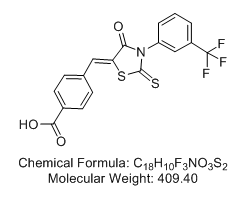|

4-[[4-Oxo-2-thioxo-3-[3-(trifluoromethyl)phenyl]-5-thiazolidinylidene]methyl]-benzoic acid (CFTRinh-172)
It blocks CFTR-dependent Cl- currents in airway cells with KI ~ 300 nM, nearly 500-fold more potent than that of the reference CFTR blocker glibenclamide
OTAVAchemicals Catalogue Number: 0129690030
CAS Registry Number: 307510-92-5
Purity: 95%+ (HPLC)
Ref.: Verkman et al. Thiazolidinone CFTR inhibitor identified by high-throughput screening blocks cholera toxin-induced intestinal fluid secretion. Journal of Clinical Investigation (2002), 110, 1651-1658
Abstract: Secretory diarrhea is the leading cause of infant death in developing countries and a major cause of morbidity in adults. The cystic fibrosis transmembrane conductance regulator (CFTR) protein is required for fluid secretion in the intestine and airways and, when defective, causes the lethal genetic disease cystic fibrosis. The most potent compound discovered by screening of structural analogs, CFTRinh-172, reversibly inhibited CFTR short-circuit current in less than 2 min in a voltage-independent manner with KI approx. 300 nM. CFTRinh-172 was nontoxic at high concentrations in cell culture and mouse models. Fully inhibiting CFTR, CFTRinh-172 did not prevent elevation of cellular cAMP or inhibit non-CFTR Cl- channels, multidrug resistance protein-1 (MDR-1), ATP-sensitive K+ channels, or a series of other transporters. A single i.p. injection of CFTRinh-172 (250 μg/kg) in mice reduced by more than 90% cholera toxin-induced fluid secretion in the small intestine over 6 h. Thiazolidinone CFTR inhibitors may be useful in developing large-animal models of cystic fibrosis and in reducing intestinal fluid loss in cholera and other secretory diarrheas.
|
 HOME
HOME ABOUT
ABOUT
 SERVICES
SERVICES
 PRODUCTS
PRODUCTS
 Targeted Libraries
Targeted Libraries
 Biochemicals
Biochemicals
 RESEARCH
RESEARCH
 DOWNLOADS
DOWNLOADS ORDERING
ORDERING
 CONTACTS
CONTACTS


